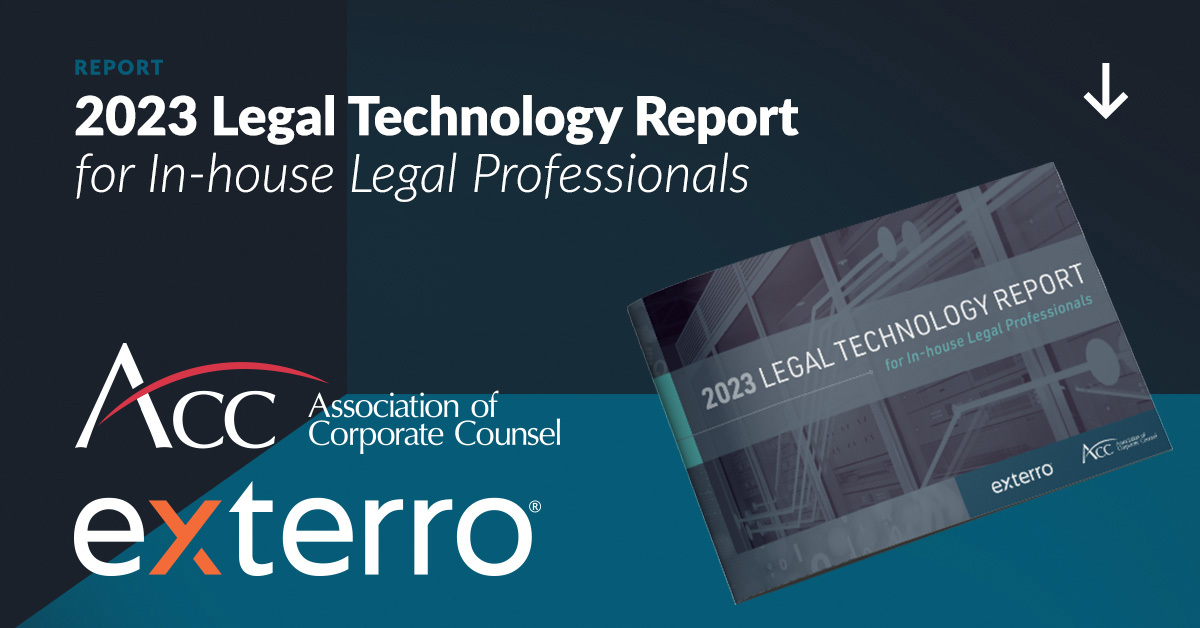Data Risk Management
5 Key Takeaways from the 2023 ACC Legal Technology Report
May 31, 2023
The Association of Corporate Counsel (ACC) and Exterro, the leader in Legal GRC software, once again partnered on an in-depth survey of in-house legal departments, this time producing the 2023 Legal Technology Report for In-House Legal Professionals. With survey responses from 252 in-house counsel and legal operations professionals across 22 countries, this report presents the types of legal technology organizations are using and their perceived effectiveness, purchasing behavior, and top technology challenges. The results reveal a number of trends in the legal technology market, and in-house legal professionals should be aware of some key takeaways that can affect how they work most efficiently in support of their departments and businesses.
Key Takeaway #1: Legal technology is now a must-have.
Seventy-eight percent of respondents now say that legal technology is a “must-have” for in-house legal departments. Compared with two years ago, this is an increase of 15 percent. One hundred percent of legal departments who said their processes were optimized thought legal technology is a must-have. This makes sense, as workloads, data volumes, data sources, and regulatory requirements are all increasing; it's simply impossible to keep up without technology. Based on that, to achieve an optimized state, technology cannot be overlooked.
Key Takeaway #2: More companies are showing greater structure and sophistication in their legal processes.
Legal processes can range from unsophisticated and ad hoc with no management or budget (level one) to highly sophisticated and optimized with significant budget, resources, and buy-in (level five). Compared to 2021, more companies are now at a level three (defined) or four (managed), having more structured and well-defined legal processes with dedicated support, budget, and sponsorship. Fewer companies reported having legal processes at a level one or two (repeatable).
Key Takeaway #3: Highly optimized departments are more likely to purchase additional technology.
Thirty-eight percent of all respondents said their organization will purchase or upgrade legal software over the next year. Contract management, matter management, and document repository software are the top three technology categories that organizations are currently assessing for purchase. Sixty-four percent of highly optimized departments plan to purchase additional software, whereas only 23 percent of departments with ad hoc processes plan to make a technology purchase.
Key Takeaway #4: Legal departments are looking to broaden technology use cases.
The biggest increases in use of legal technology have occurred in contract management (up 15 percent), legal hold (13 percent), matter management (nine percent) and data collection and processing (eight percent). Nevertheless, legal departments are still looking to leverage software more effectively in areas like contracts, privacy/compliance, litigation, and cybersecurity/data breach response.
Key Takeaway #5: The top challenge is software interoperability.
Legal teams face numerous pain points when using legal technology such as having to learn a variety of user interfaces, lack of intuitive design, having manual processes within the software, and experiencing a lack of IT support. However, the top pain point identified by 62 percent of respondents is the lack of interconnectivity across their various software applications. Forty-three percent of respondents thought a comprehensive technology platform could help reduce the challenge of using multiple, disparate technology solutions.
For a more detailed look at these key takeaways, download the full report today!
